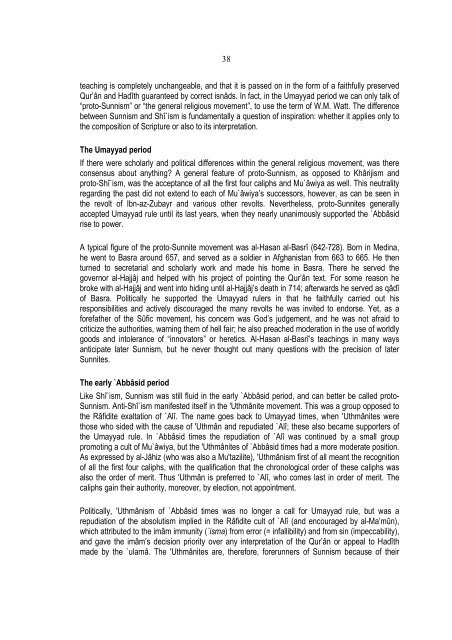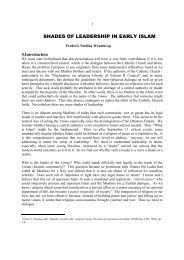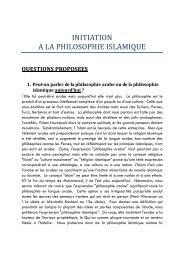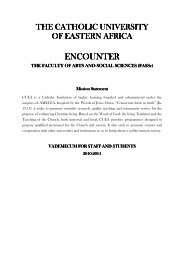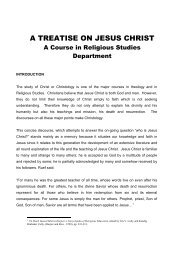INTRODUCTION TO ISLAMIC THEOLOGY.pdf - CUEA
INTRODUCTION TO ISLAMIC THEOLOGY.pdf - CUEA
INTRODUCTION TO ISLAMIC THEOLOGY.pdf - CUEA
You also want an ePaper? Increase the reach of your titles
YUMPU automatically turns print PDFs into web optimized ePapers that Google loves.
38teaching is completely unchangeable, and that it is passed on in the form of a faithfully preservedQur’ân and Hadîth guaranteed by correct isnâds. In fact, in the Umayyad period we can only talk of“proto-Sunnism” or “the general religious movement”, to use the term of W.M. Watt. The differencebetween Sunnism and Shî`ism is fundamentally a question of inspiration: whether it applies only tothe composition of Scripture or also to its interpretation.The Umayyad periodIf there were scholarly and political differences within the general religious movement, was thereconsensus about anything? A general feature of proto-Sunnism, as opposed to Khârijism andproto-Shî`ism, was the acceptance of all the first four caliphs and Mu`âwiya as well. This neutralityregarding the past did not extend to each of Mu`âwiya’s successors, however, as can be seen inthe revolt of Ibn-az-Zubayr and various other revolts. Nevertheless, proto-Sunnites generallyaccepted Umayyad rule until its last years, when they nearly unanimously supported the `Abbâsidrise to power.A typical figure of the proto-Sunnite movement was al-Hasan al-Basrî (642-728). Born in Medina,he went to Basra around 657, and served as a soldier in Afghanistan from 663 to 665. He thenturned to secretarial and scholarly work and made his home in Basra. There he served thegovernor al-Hajjâj and helped with his project of pointing the Qur’ân text. For some reason hebroke with al-Hajjâj and went into hiding until al-Hajjâj’s death in 714; afterwards he served as qâdîof Basra. Politically he supported the Umayyad rulers in that he faithfully carried out hisresponsibilities and actively discouraged the many revolts he was invited to endorse. Yet, as aforefather of the Sûfic movement, his concern was God’s judgement, and he was not afraid tocriticize the authorities, warning them of hell fair; he also preached moderation in the use of worldlygoods and intolerance of “innovators” or heretics. Al-Hasan al-Basrî’s teachings in many waysanticipate later Sunnism, but he never thought out many questions with the precision of laterSunnites.The early `Abbâsid periodLike Shî`ism, Sunnism was still fluid in the early `Abbâsid period, and can better be called proto-Sunnism. Anti-Shî`ism manifested itself in the 'Uthmânite movement. This was a group opposed tothe Râfidite exaltation of `Alî. The name goes back to Umayyad times, when 'Uthmânites werethose who sided with the cause of 'Uthmân and repudiated `Alî; these also became supporters ofthe Umayyad rule. In `Abbâsid times the repudiation of `Alî was continued by a small grouppromoting a cult of Mu`âwiya, but the 'Uthmânites of `Abbâsid times had a more moderate position.As expressed by al-Jâhiz (who was also a Mu'tazilite), 'Uthmânism first of all meant the recognitionof all the first four caliphs, with the qualification that the chronological order of these caliphs wasalso the order of merit. Thus 'Uthmân is preferred to `Alî, who comes last in order of merit. Thecaliphs gain their authority, moreover, by election, not appointment.Politically, 'Uthmânism of `Abbâsid times was no longer a call for Umayyad rule, but was arepudiation of the absolutism implied in the Râfidite cult of `Alî (and encouraged by al-Ma’mûn),which attributed to the imâm immunity (`isma) from error (= infallibility) and from sin (impeccability),and gave the imâm’s decision priority over any interpretation of the Qur’ân or appeal to Hadîthmade by the `ulamâ. The 'Uthmânites are, therefore, forerunners of Sunnism because of their


